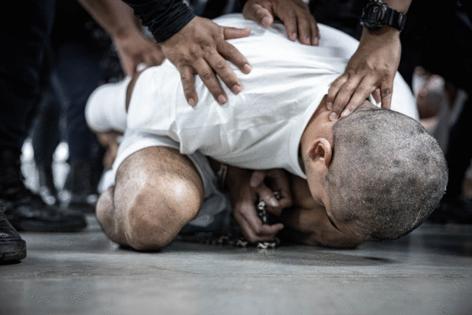Trump asks Supreme Court to let him deport more Venezuelans under wartime powers
Published in News & Features
WASHINGTON — President Donald Trump has formally asked the U.S. Supreme Court to intervene in his effort to deport alleged Venezuelan gang members using a 227-year-old wartime law.
A brief filed by Acting Solicitor General Sarah H. Harris on Friday asks the nation’s highest court to vacate the order issued by a U.S. District Court, which imposed a temporary restraining order blocking the administration from facilitating more deportation flights using that law because it failed to include a process allowing gang members to challenge their designation.
The Trump administration has argued that single judge should not be able to impede a president’s national security mission.
“This case presents fundamental questions about who decides how to conduct sensitive national-security-related operations in the country — the president, through Article II or the judiciary, through TROs,” reads the government’s brief. “The Constitution supplies a clear answer: the president. The republic cannot afford a different choice.”
The Trump administration deported more than 200 Venezuelans to El Salvador on March 15, triggering a two-week legal melee that led to this moment.
Mervin Jose Yamarte Fernandez, 29, is one of the Venezuelans accused by the Trump administration of gang affiliation and sent to El Salvador’s Terrorist Confinement Center. His sister identified him in a video shared on social media by the Salvadoran government. “He shouldn’t be imprisoned in El Salvador, let alone in a dangerous prison like the one where the Mara Salvatruchas are held,” his sister told the Miami Herald. El Salvador Presidential Press Office
On Thursday, a three-panel appeals court voted 2-to-1 to reject a Justice Department effort to lift U.S. District Judge James E. Boasberg’s order, leaving the Supreme Court as the next obvious step.
Boasberg has said the government needs to prove that the people slated to be deported — in this case, alleged Tren de Aragua gang members — are in fact “alien enemies” prior to removing them from the country.
“Before they may be deported, they are entitled to individualized hearings to determine whether the Act applies to them at all,” wrote Boasberg in his ruling against the Trump administration. “Because the named Plaintiffs dispute that they are members of Tren de Aragua, they may not be deported until a court has been able to decide the merits of their challenge.”
The dispute was triggered by a lawsuit by Venezuelans who said they were wrongly accused and on the verge of being deported and sent to a maximum security prison in El Salvador.
During a court hearing Monday, American Civil Liberties attorney Lee Gelernt told the appeals court panel he planned to show that “many, if not most removed” did not have a connection to Tren de Aragua, a significant claim that could bolster the plantiffs’ broader case against Trump’s invocation of the Alien Enemies Act.
In its case to the Supreme Court, the Trump administration claims that the district court’s orders “have rebuffed the president’s judgements as to how to protect the nation against foreign terrorist organizations.”
Temporoary restraining orders, as used in this case by Boasberg, have been used more than 40 times this year against the Trump administration, the government states in its brief.
Top staffers in the Trump administration have long expected some of their most contentious policies would end up before the Supreme Court, which is now comprised of three of the president’s own appointees.
James Blair, a White House deputy chief of staff, recently said the administration was comfortable litigating the debate not only in the court of law, but in the wider court of public opinion.
“If people think judges should have all-knowing and seeing and consuming power, then I guess they’ll tell us that in 2026, but I think that’s a debate we’re willing to encourage in the public,” Blair told a Politico podcast last week.
©2025 Miami Herald. Visit at miamiherald.com. Distributed by Tribune Content Agency, LLC.







Comments